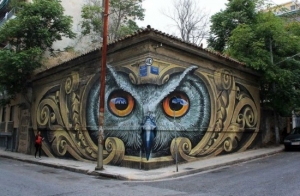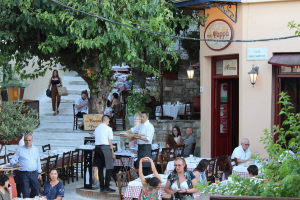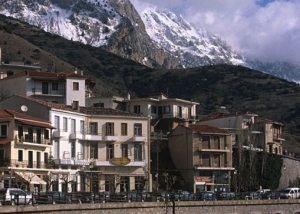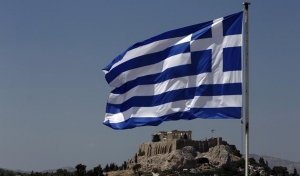XpatAthens
Graffiti By Local Artist In Athens Goes Viral
Stunning Photos By Athens-Based Photographer Showcase Greece Under The Sun
The Best Greek Islands For Family Holidays
Success For YES to Shipping Forum - Providing Opportunities In The Maritime Industry
Fun Things To Do In Athens With Teenagers
Olympic Games Workout
How to make your teen zone out? Take them on a traditional sight-seeing tour where they get talked at for hours on end. Do you prefer to see them engaged and enjoying themselves? Sign them up for a 2-hour Olympic Games Workout that combines history with the right amount of physical challenges to teach you about the Olympic Games, both ancient and modern. The kids will love the end game: running on the epic Panathenaic track at the world’s only all-marble stadium, the birthplace of the modern Olympics.
Malakasa Adventure Park
It’s hard to be all moany and shruggy when you’re flying from tree to tree fifteen metres above the ground. If city fatigue has set in, this adventure park is one of the most enjoyable family days out in Athens. The park is an addictive network of Tarzan swings and zip slides laid out over 50 acres of forest, about 40 minutes north of the city-centre, divided into age-appropriate skill levels. It’s lovely and cool in the summer and in the wintertime, you’ll appreciate the alpine atmosphere. You can buy coffee and drinks, but there are no food facilities, so bring along some snacks. Picnic among the pines on wooden benches, or stop off at one of the traditional tavernas in Malakasa town, a few minutes away.
Water Sports on the Athens Riviera
Does your teen believe they can walk on water? From May to early October, put them to the test with a stand-up paddleboard session at Yasurfaki water sports club. Located inside Varkiza resort, one of the biggest—and cleanest—organised sandy beaches on the Athens Riviera, Yasurfaki has been a massive hit with local families and is. Yasurfaki offers all kinds of watersports, such as windsurfing, wakeboarding, and banana boats. Out of the water, there’s plenty to amuse your brood while you get your vitamin sea: beach volleyball, outdoor gyms, teen-cuisine like pizzas, burgers and souvlaki, and beach bars with summery DJ sets. You’ll pay an entrance fee of about €5-7 to access Varkiza Resort; extra for the watersports.
Museum of Illusions
Disappear down the rabbit hole at this small but fascinating novelty museum where nothing is what it seems. Perfectly-pitched for the Insta-generation, your teens will love putting their own filters and spin on some of the most popular illusions such as the Upside Down Room and the Head on a Plate. They’ll also pick up a lesson or two on vision, perception and the science of the human brain. Even though there’s probably only enough here to spend an hour or so, but the museum is located in a lively part of Athens that’s worth exploring afterwards. A little shop by the exit sells brain teasers and puzzles.
The Mind Trap
Tick tock, you’re on the clock. You have just 60 minutes to puzzle it out and escape from whatever deadly mission you’ve signed up for. Teens love the adrenaline rush of escape rooms, where they must work in small teams to crack clues and riddles during a dramatic scenario inspired by anything from Breaking Bad to Game of Thrones. Downtown Athens has several venues hosting daily escape room sessions in English. At The Mind Trap, which has branches in Monastiraki and Kolonaki, rebellious teens will get a kick out of playing “anti-hero” in the Ebola room: the goal is to release the killer virus before getting arrested.
Athens Street Art Tour
Teens are naturally drawn to the subversive energy of graffiti, and Athens has one of the hottest street art scenes in Europe. Find out the difference between “tagging” and “bombing” while you encounter some of the capital’s coolest neighbourhoods. Your guide Nikos is the real deal: a local painter, graphic designer and street artist himself. On this excellent 3-hour tour, he’ll reveal the political and social meanings, and hidden messages behind Athens street art—including ‘All Dogs go to Heaven’, a mural tribute to Loukaniko, the stray dog who loved to tag along on political demonstrations.
Latraac Skate Park
Impress your kids with your local street cred by taking them to this happening skate park in the Keramikos neighbourhood. Latraac—an experimental social space built by Greek skater and architect Zachos Varfis—has become ground zero for the Athens skate scene. Hidden from the street behind metal gates, it has the thrill of an insider secret. Even if you don’t have access to a skateboard, Latraac makes for brilliant street theatre: watch bowl contests or hard-core skaters perfect their moves on the laser-cut plywood bowl. Or soak up the creative buzz of the many artists and musicians who hang out here. Setting Latraac apart from other skate parks in the city is a hip bar and café where you can settle in and enjoy the show. They do a great weekend brunch, including pancakes, toasties and scrambled eggs.
To read more, please visit This is Athens
Whether you've just arrived in town – or have been here for years – Athens always has new secrets to share! This is Athens is the official guide to this captivating city of ancient energies and booming urban culture. Compiled by a team of specialist local writers, This is Athens brings you an authentic and intimate portrait of a living Athens beyond the guidebooks – along with daily curated listings of all the best events and great weekend inspiration all-year round. From must-know neighbourhoods and emerging art hubs, to gourmet hotspots, cool shopping and the buzziest bars, This is Athens will help you to get the most out of living in Athens!
Thank you This is Athens for your contribution as an XpatAthens Partner.
Services Of Athens Municipality Become Fully Digitized
The digitization of the total of the municipality’s agencies until the end of 2022 was mayor of Athens Kostas Bakoyannis’ personal commitment, according to an announcement on Monday.
A total of 207 services are available to all Athenians after the addition of the last 56 services to the municipality’s platform.
The platform is in Greek.
5 Of The Oldest Restaurants In Athens
1. The Old Tavern of Psarras
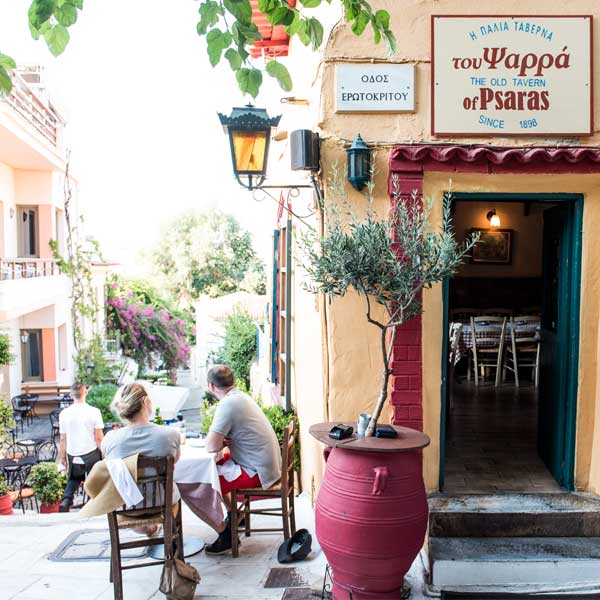
Courtesy of "The Old Tavern of Psarras".

@leloudas1928

@vassilenasrestaurant

Credit: Πάνος Χ.

Courtesy of "To Kafeneion".
Chytirio
Athens has an abundance of theatre options – a fact which should not come as a surprise to anyone, given that it was invented here! From big international shows to tiny and wonderfully obscure neighbourhood productions, Athens truly has something for every taste.
Apart from the various year-round offerings around the city, one of my favourite theatre events is the annual ‘Hellenic Festival’ – also called the Athens & Epidaurus Festival (www.greekfestival.gr/en/) which happens every summer. The festival offers a great range of classical and modern theatrical masterpieces and musical performances at the stunning Herodeon and Epidaurus theatres.
But back to winter reality… I often drive or walk by a place called ‘Chytirio’, in the Gazi/Kerameikos neighborhood. It’s an unassuming little building with performance adverts posted outside. I’ve often wondered what goes on in here… So the other night I bought a couple of tickets (a steal at €8 each) to a show called ‘Aires de Argentina’ at the Chytirio.
Chytirio means ‘foundry’ – and I’d like to believe the building was once, perhaps, a foundry. It is styled as a ‘Theatre / Art Café’. In any case, the venue is rather interesting: direct entry into an outdoor garden space set-up for summer shows, a small indoor bar/café, and a small (150 person) theatre, with exposed stone walls and a ‘small space’, intimate feeling. Athenian, to be sure.
This was a musical performance more than theatre – a ‘trip around Argentina’ through music and dance. (Has anyone else noticed that Athens seems to be in love with Argentinean music and dance??) It was a very pleasant evening – nice music, relaxed and easy, like a private performance by a group of friends – complete with wine served to you during the show.
Chytirio seems to have something for everyone – music & theatre, local and not-so-local. Worth a look to see if anything catches your eye!
Muy bien!
Chytirio (Χυτήριο)
Iera Odos 44, Kerameikos
210 3412313
www.chytirio.gr (Greek only)
Until next week,
Jack
In this weekly space, keep up with ‘Jack’ as he navigates daily life in Athens… Anecdotes, stories, hits & misses, the good, the bad and, well, the rest…
Top Winter Destinations - Arachova and Karpenisi
Where: Aráchova is a mountainous village nestling picturesquely at the foot of Mt. Parnassós in Viotia, Southern Greece. Why: Because it is the most cosmopolitan winter destination in Greece, a great favourite for passionate ski lovers and celebrities, or just first-time visitors who wish to relax in a dreamy mountainous setting with modern tourism facilities.
Its modern ski resort, its close proximity to Athens, and its breathtaking mountainous landscape are the strongest reason why. Apart from the mountain activities, Aráchova is also famous for its bustling nightlife!
Must visit: The Byzantine churches of the village with their well preserved frescos.
Activities on offer: Get involved in outdoor activities such as hiking or ski down the slopes of Mt. Parnassós at the biggest downhill ski resort in Greece. The mountain’s high altitude offers ski lovers long-lasting snow cover at the peaks.
Hot tips:
• Discover the traditional character of the village by taking leisurely walks through its narrow cobblestone streets. Enjoy hot and sweet or soft and fruity drinks in cafés, or traditional kafeneia (coffee shops).
• Stay up all night and enjoy the village’s bustling nightlife. There are a plethora of bars and clubs up and down the streets of Aráhova.
• Visit the nearby archaeological site of Delphi.
Accommodation: Various elegant first-class hotels or traditional guest houses offer luxurious accommodation.
Famous local products: Aráhova offers a memorable gourmet experience; taste local specialties: kontosoúvli (big hunks of pork skewered and put on a rotisserie with onions, tomatoes, peppers and seasoned with salt and pepper, garlic and oregano), kokorétsi (the intestines of the lamb stuffed with offal), sarmádes (stuffed grape leaves), traditional pies, handmade trahanás (pasta soup, can be sweet or sour), and hilopites (egg noodles made in linguine-sized strips, cut into small pieces).
Aráhova also produces the famous cheese “formaéla”, a sweet smelling hard rind cheese of with a relatively mild flavour that you should definitely taste!
Have a sip of the divine Parnassós local wine, the red “Mavroudi”, which achieved Protected Designation of Origin status in 2006. The “Black Aráhova vine” is a full-bodied prolific variety that produces wines of a deep red hue with a high alcohol content.
Complete your meal with traditional “spoon-sweets”, or even better, try yogurt with honey, a dessert served compliments of the house. Before you leave Aráhova, pick up some hand-made beautifully coloured woven carpets (flocati rugs) and textiles to take with you as a going-away present.
Karpenissi
Where: A mountain village situated in Evritania, Greece.
Why: Towering snow capped mountains; deep ravines; fast-flowing rivers and lakes; impressive gorges; Byzantine monasteries and tiny mountain villages make out an form an alpine landscape that promises to offer the ultimate winter experience!
Must visit: The most popular sights of Karpenissi: The Byzantine Church of Agia Triada in Karpenissi, the Church of Panagia in Fousiana, Agia Paraskevi in Vraggiana and Proussos Monastery, the Library and the picturesque squares of Markos Botsaris and Katsantonis, both famous heroes of the Revolution.
Activities: Trekking along winding mountain paths; canoe-kayaking in Kremaston Lake; kayaking and rafting down the Aheloos, Tavropos and Trikeriotis rivers; horse riding; canoeing through the gorges of Viniani and Vothonas; jeep safari and skiing at the modern ski resort of Karpenissi, one of the biggest and most popular in Greece.
Follow scenic routes and admire the undulating natural surroundings. Two suggested routes are: Karpenissi - Gorgianades - Korishades - Klausi - Voutiro - Nostimo - Megalo Horio - Mikro Horio - Palio Mikro Horio – Proussos and Karpenissi - Viniani - Kerasohori - Marathos - Monastiraki - Epiniana - Agrafa - Tridendro - Trovato - Vraggiana – Agrafa.
Hot tip: Visit the beautifully preserved district of Korishades and tour its fascinating museums such as the National Resistance Museum; visit restored manor houses, Byzantine churches, schools transformed into museums and the arched bridges of the area, wonderful examples of local architecture.
Accommodation: Choose from among family run pensions, welcoming guesthouses or luxurious hotels!
Famous local products: Taste fried trout and mushrooms (morchella) in red sauce. Other exquisite local products on offer include Katiki, which is a Euritanian goat cheese, feta cheese, yoghurt and butter, local meat, beans, noodles, pasta, chestnuts and walnuts, berries, black cherries, crab apples, figs and kumquats, honey and superb “spoon sweets” as well as wine, tsipouro and liqueurs. Don’t forget to buy folk art products, like handmade rugs and woven fabrics of exceptional quality.
To read more, please see visitgreece.gr
300 Intellectuals And Academics In Support Of Greece
Some 300 internationally acclaimed academics and intellectuals from across the globe have signed and published an open letter in support of Greece and Europe, demanding from the European governments, the European Commission, the European Central Bank (ECB) and the International Monetary Fund (IMF) to respect the mandate of the Greek people for a new negotiation between the country’s government and its partners in order to agree to a new program and resolve the long-standing debt problem.
The open letter was published online on a website founded by journalist and former editor in chief of French daily newspaper Le Monde, Edwy Plenel.
Among others, the letter is signed by economists James Kenneth Galbraith of the University of Texas at Austin, Stephany Griffith-Jones of the Columbia University in New York, Jacques Sapir of the Ecole des Hautes Etudes en Sciences Sociales (EHESS) in Paris, psychiatrist Gerald Epstein of the American Institute for Mental Imagery and philosopher/sociologist Dominique Meda of the Universite Paris-Dauphine.
The full letter in English:
We the undersigned call on the governments of Europe, the European Commission, the European Central Bank and the IMF to respect the decision of the Greek people to choose a new course and to engage the new government of Greece in good faith negotiations to resolve the Greek debt.
The government of Greece is correct to insist on new policies because the previous policies have failed. They have not brought economic recovery. They have not brought financial stability. They have not brought jobs or foreign investments. They have stressed and damaged Greek society and weakened Greek institutions. There is therefore no value in that approach and no progress to preserve. We urge Greece’s European partners to accept this reality, without which the new government would have never been elected.
To read more, please visit greekreporter.com
By Aggelos Skordas

